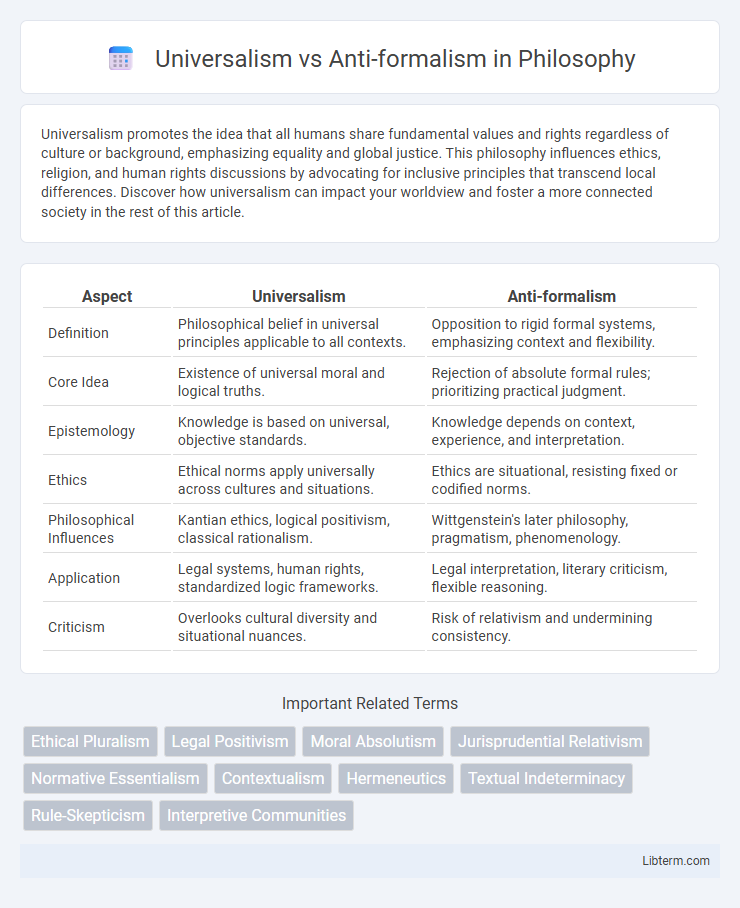Universalism promotes the idea that all humans share fundamental values and rights regardless of culture or background, emphasizing equality and global justice. This philosophy influences ethics, religion, and human rights discussions by advocating for inclusive principles that transcend local differences. Discover how universalism can impact your worldview and foster a more connected society in the rest of this article.
Table of Comparison
| Aspect | Universalism | Anti-formalism |
|---|---|---|
| Definition | Philosophical belief in universal principles applicable to all contexts. | Opposition to rigid formal systems, emphasizing context and flexibility. |
| Core Idea | Existence of universal moral and logical truths. | Rejection of absolute formal rules; prioritizing practical judgment. |
| Epistemology | Knowledge is based on universal, objective standards. | Knowledge depends on context, experience, and interpretation. |
| Ethics | Ethical norms apply universally across cultures and situations. | Ethics are situational, resisting fixed or codified norms. |
| Philosophical Influences | Kantian ethics, logical positivism, classical rationalism. | Wittgenstein's later philosophy, pragmatism, phenomenology. |
| Application | Legal systems, human rights, standardized logic frameworks. | Legal interpretation, literary criticism, flexible reasoning. |
| Criticism | Overlooks cultural diversity and situational nuances. | Risk of relativism and undermining consistency. |
Defining Universalism and Anti-formalism
Universalism advocates for the application of uniform legal principles across all cases, emphasizing consistency and predictability in judicial decisions. Anti-formalism rejects rigid legal formalism, promoting flexibility and context-sensitive interpretation to achieve just outcomes. These opposing views highlight the tension between rule-based decision-making and the need for adaptability within the legal system.
Historical Roots of the Debate
The debate between Universalism and Anti-formalism traces back to the early 20th century, rooted in contrasting views on legal interpretation and judicial decision-making. Universalism emphasizes applying consistent, objective principles across cases, drawing from Enlightenment thinkers like Immanuel Kant who championed rationality and universal moral laws. Anti-formalism emerged as a response, influenced by American Legal Realism and figures such as Oliver Wendell Holmes Jr., arguing that law must be interpreted in context with social realities and indeterminate outcomes.
Philosophical Foundations of Universalism
Universalism in philosophy asserts that certain principles or truths apply universally across cultures and contexts, emphasizing objective standards in ethics and knowledge. It is grounded in the belief that there are inherent human rights and moral values that transcend individual or cultural differences, drawing from Enlightenment thinkers like Immanuel Kant. This foundation contrasts with Anti-formalism, which critiques rigid structures and emphasizes contextual, situational judgment over universal rules.
Core Principles of Anti-formalism
Anti-formalism emphasizes the interpretive flexibility of legal texts, prioritizing the intention behind laws over their literal wording. Core principles include rejecting mechanical application of rules, recognizing the importance of context, and promoting judicial discretion to achieve equitable outcomes. This approach challenges universalism by arguing law cannot be applied uniformly without considering social and historical factors.
Universalism in Legal Theory and Practice
Universalism in legal theory asserts the existence of objective, universal principles that govern justice and law across all cultures and societies, emphasizing the application of consistent legal standards. This approach challenges relativistic perspectives by upholding the idea that fundamental human rights and legal norms transcend local customs and variations. In legal practice, universalism supports international law frameworks and human rights conventions, promoting uniformity and predictability in the enforcement of laws globally.
Anti-formalism’s Critique of Legal Formality
Anti-formalism critiques legal formality by arguing that rigid adherence to established rules and procedures often overlooks the complexities and social realities of individual cases, leading to unjust outcomes. This perspective emphasizes the necessity for judicial discretion and interpretive flexibility to achieve substantive justice beyond mechanical application of laws. Legal formalism's reliance on fixed legal principles is seen as insufficient for addressing the dynamic and evolving nature of societal values and moral considerations.
Major Thinkers: Universalists vs Anti-formalists
Universalism, supported by thinkers like Immanuel Kant and John Rawls, emphasizes universal principles and objective moral laws applicable across contexts. Anti-formalism, advocated by philosophers such as W.V.O. Quine and Richard Rorty, challenges rigid frameworks and prioritizes contextual, pragmatic, and language-based interpretations of meaning and truth. The debate highlights contrasting approaches to normativity, ethics, and epistemology in philosophy and cognitive science.
Impacts on Contemporary Jurisprudence
Universalism in jurisprudence promotes consistent application of laws across diverse contexts, ensuring predictability and stability in legal systems worldwide. Anti-formalism challenges rigid legal categories, advocating for flexibility and consideration of social realities which enhances adaptability and responsiveness in contemporary legal decision-making. The tension between these approaches shapes modern legal theory by balancing objective rule-following with the need for contextual interpretation and justice.
Case Studies: Universalism vs Anti-formalism in Action
Case studies in legal theory highlight Universalism's emphasis on consistent application of universal principles across cases, promoting predictability and fairness in judicial decisions. In contrast, Anti-formalism advocates for case-by-case analysis, stressing the importance of context, social realities, and pragmatic outcomes over rigid rule application. Landmark cases such as Brown v. Board of Education exemplify Anti-formalism by prioritizing social justice considerations, while Universalism is illustrated in decisions like Marbury v. Madison that reinforce structured legal doctrines.
Future Directions and Ongoing Debates
Future directions in the Universalism versus Anti-formalism debate emphasize interdisciplinary approaches integrating cognitive science, linguistics, and cultural studies to better understand language acquisition and processing. Ongoing debates focus on the extent to which innate grammatical structures exist versus language as a product of social interaction and cognitive constraints, with recent empirical studies challenging strict Universal Grammar theories. Advances in neuroimaging and computational modeling continue to reshape perspectives, suggesting more dynamic and context-sensitive frameworks that bridge formalist and anti-formalist positions.
Universalism Infographic

 libterm.com
libterm.com